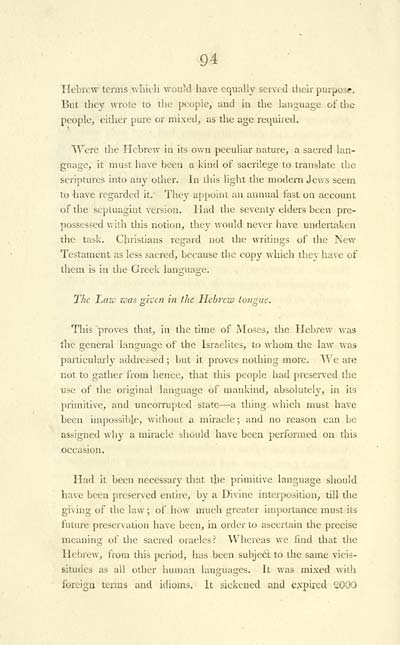Blair Collection > Celtic researches, on the origin, traditions & language, of the ancient Britons
(184)
Download files
Complete book:
Individual page:
Thumbnail gallery: Grid view | List view

94
Hebrew terms wliieh would have equally served iheir purpose.
But they wrote to the people, and in the language of the
people, cither pure or mixed, as the age required.
AVere the Hebrew in its own pecuhar nature, a saered lan-
guage, it must have been a kind ot" sacrilege to translate tlîe
scriptures into any other. In this hght the modern Jews seem
to -have regarded it." They appoint an annual fast on account
of the septuagint version. Had the seventy elders been pre-
possessed v.ith this notion, they would never have undertaken
the task. Christians regard not the Λvritings of the New
Testament as less sacred, because the copy which they have of
them is in the Greek lans-ua^e.
The Ldto was <yixen in the Hebrew ton<iue.
This proves that, in the time of Moses, the Hebrew was
the general language of the Israelites, to whom the law was
particularly addressed ; but it proves nothing more, ^^"e are
not to gather from hence, that this people had i)reserved the
use of the original language of mankind, absolutely, in its
primitive, and uncorrupted state — ^a thing which must have
been impossible, without a miracle ; and no reason can be
assigned why a miracle should have been performed on this
occasion.
Had it been necessary that the primitive language should
have been preserved entire, by a Divine interposition, till the
giving of the law ; of how much greater importance must its
future preservation have been, in order to ascertain the precise
meaning of the sacred oracles? Whereas we find that the
Hebrew, from this period, has been subjeòf to the same vicis-
situdes as all other human languages. It was mixed with
foreiga terms and idioms. It sickened ami expired 2O0O
Hebrew terms wliieh would have equally served iheir purpose.
But they wrote to the people, and in the language of the
people, cither pure or mixed, as the age required.
AVere the Hebrew in its own pecuhar nature, a saered lan-
guage, it must have been a kind ot" sacrilege to translate tlîe
scriptures into any other. In this hght the modern Jews seem
to -have regarded it." They appoint an annual fast on account
of the septuagint version. Had the seventy elders been pre-
possessed v.ith this notion, they would never have undertaken
the task. Christians regard not the Λvritings of the New
Testament as less sacred, because the copy which they have of
them is in the Greek lans-ua^e.
The Ldto was <yixen in the Hebrew ton<iue.
This proves that, in the time of Moses, the Hebrew was
the general language of the Israelites, to whom the law was
particularly addressed ; but it proves nothing more, ^^"e are
not to gather from hence, that this people had i)reserved the
use of the original language of mankind, absolutely, in its
primitive, and uncorrupted state — ^a thing which must have
been impossible, without a miracle ; and no reason can be
assigned why a miracle should have been performed on this
occasion.
Had it been necessary that the primitive language should
have been preserved entire, by a Divine interposition, till the
giving of the law ; of how much greater importance must its
future preservation have been, in order to ascertain the precise
meaning of the sacred oracles? Whereas we find that the
Hebrew, from this period, has been subjeòf to the same vicis-
situdes as all other human languages. It was mixed with
foreiga terms and idioms. It sickened ami expired 2O0O
Set display mode to: Large image | Transcription
Images and transcriptions on this page, including medium image downloads, may be used under the Creative Commons Attribution 4.0 International Licence unless otherwise stated. ![]()
| Early Gaelic Book Collections > Blair Collection > Celtic researches, on the origin, traditions & language, of the ancient Britons > (184) |
|---|
| Permanent URL | https://digital.nls.uk/75765905 |
|---|
| Description | A selection of books from a collection of more than 500 titles, mostly on religious and literary topics. Also includes some material dealing with other Celtic languages and societies. Collection created towards the end of the 19th century by Lady Evelyn Stewart Murray. |
|---|
| Description | Selected items from five 'Special and Named Printed Collections'. Includes books in Gaelic and other Celtic languages, works about the Gaels, their languages, literature, culture and history. |
|---|

